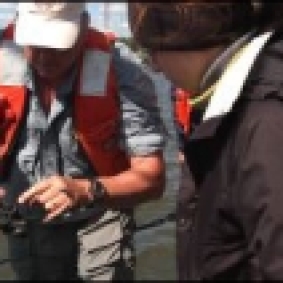Eight students will be presenting the summer work at the Ocean Sciences Meeting in March 2022!
Thaìs Daddario, Rhode Island College
Class Year:
2005Mentor:
Marcelino Suzuki, Ph.D.Project Title:
Analysis of rRNA Genes of a Fosmid Library Constructed from Chesapeake Bay Bacterioplankton
Abstract:
Bacterioplankton play crucial roles in marine and estuarine environments. They comprise one of the largest biomass pools in these systems and are responsible in great part for important environmental processes such as nutrient cycling and organic matter decomposition. As part of a larger effort to understand these organisms, we have sought to characterize the presence and relative abundance of bacterioplankton in surface waters of Station 834 in the mid Chesapeake Bay. Specifically, we have constructed a Fosmid library that was subsequently screened for rRNA fragments. A series of PCR reactions using fluorescently labeled primers were performed in order to amplify three specific rRNA fragments. Such fragments have natural length variations the combinations of which are phylotype-specific. The results showed a very diverse bacterial community and suggested year-to-year variation in community structure. Five of the phylotypes present were putatively identified based on comparison with existing operon libraries, three of which belong to freshwater Actinobacteria in groups ACI-C, ACIV-D, and ACIV-C, one was a member of the Alphaproteobacterium from the Roseobacter group, and one a member of the Bacteroidetes phylum.
Location:
Chesapeake Biological LaboratoryPresentations:
Daddario, T.*, and M. Suzuki. 2006. Analysis of ribosomal RNA genes of a fosmid library constructed from Chesapeake Bay bacterioplankton . ASLO Ocean Sciences Meeting, Honolulu, Hawaii .



